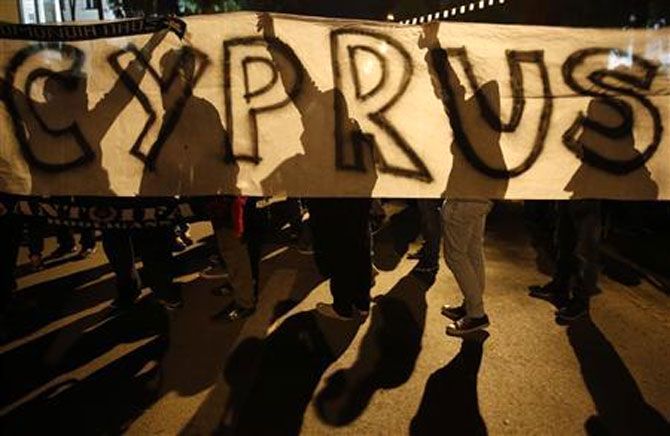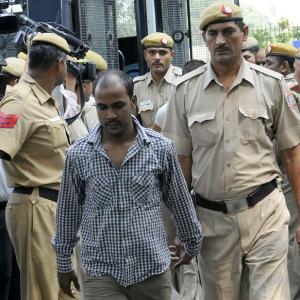The sluggish legal system in India makes it extremely difficult for law-enforcing agencies in the ministry of finance to punish violations of foreign exchange laws. Unfortunately, it is not just FEMA. The Prevention of Money Laundering Act too has significant infirmities, say Paranjoy Guha Thakurta and Pranati Mehra.

A legal dispute relating to companies headed by a prominent industrialist close to Prime Minister Narendra Modi has raised an interesting question: Can an Indian company become a shareholder of a foreign company and even offer corporate guarantees abroad without having paid for its shareholding in that foreign company?
This question is going to be decided by the Appellate Tribunal for Foreign Exchange (ATFE), New Delhi, in a case relating to the Mumbai-based Welspun group of companies. The case relates to simultaneous appeals filed by three group companies -- Welspun Corp Limited, Welspun Wintex Limited, Krishiraj Trading -- group promoter Bal Krishan Goenka (bottom, left) and several directors of these firms.
The dispute follows the issuance of a show-cause notice six years ago by the Enforcement Directorate in the ministry of finance against companies in the Welspun group and its promoter for alleged violation of rules relating to the use of foreign currency under the Foreign Exchange Management Act, a civil law that replaced its predecessor criminal law, the Foreign Exchange Regulation Act in 1999.
The ED has alleged that they violated FEMA in their transactions with Red Lebondal Limited, a company registered in 2007 in Cyprus, a tax haven.
The appeals by the Welspun group firms and their promoter B K Goenka were made after a special director of the ED based in Mumbai had imposed a total penalty of Rs 60 crore (Rs 600 million) against the companies and its directors in 2013.
The arguments on the appeals were made before the principal bench of the ATFE comprising the chairman of the tribunal, Justice V K Mathur and member Dr H K Mudgil.
The issue of payment of a "pre-deposit" was brought up towards the end of the arguments that were made by lawyers engaged on behalf of the Welspun group and the ED. On February 5, Justice Mathur reserved orders on this issue. Welspun has sought a waiver of the pre-deposit amount, which could be anywhere between 20 per cent and 50 per cent of the penalty imposed.
At the tribunal, senior advocate Vikram Nankani appeared for the appellants (that is, the Welspun group companies and their promoter) while the ED was represented by M R Venkatesh, a Chennai-based chartered accountant.
(In fact, the appeals that had been made "part heard" when Venkatesh pointed out that the pre-deposit issue needed to be decided first, otherwise it may set a precedent for similar other cases.)

An appellant before the tribunal is required to make a part payment of the penalties upheld in adjudication, before the appeal is heard by the tribunal, in this case, the ATFE. The contending parties will continue their arguments on the merits of the case.
The diversified Welspun group of companies, with an annual turnover of nearly $5 billion, has been promoted by Goenka, who belongs to a family of grain traders based in Hissar, Haryana. His wife Dipali Goenka is managing director of group company, Welspun Global Brands.
The group started its operations in 1985 by setting up a towels manufacturing factory at Palghar, Maharashtra. Thereafter, in 1993, another towel making unit was set up at Vapi, Gujarat. The Welspun group claims it is currently the world's second-largest producer of towels, selling its products in retail outlets in 50 countries across the world.
In 1997, the group diversified into manufacturing steel pipes, mainly for oil and gas transportation, by establishing a plant at Anjar, Gujarat. It claims it is the second-largest producer of such pipes.
In 2006, the Welspun group acquired the Christy towel brand in the UK. In the same year, it entered into a joint venture with the Adani group for oil and gas exploration. More recently, the Welspun group has got into solar energy. Like the head of the Adani group, Gautam Adani, B K Goenka is reportedly close to Prime Minister Narendra Modi.
The dispute relating to the group was summarised by Welspun's counsel thus: Since raising funds abroad is cheaper, Welspun approached ICICI Bank outside India. The bank’s London branch advised that money could be raised through a special purpose vehicle incorporated outside India.
The SPV could get loans outside as long as these were guaranteed by Welspun’s group companies in India since these are asset-bearing companies.
The appellants acquired shares in the joint venture -- Red Lebondal Limited, Cyprus (RLLC) -- in 2007, in a private transaction and not a share subscription to the memorandum of association, "as the Enforcement Directorate is making it out", Vikram Nankani claimed.
According to Cyprus law, the shareholders could pay for the shares after they had been transferred in their names.
The group’s shareholding in RLLC is as follows: Bal Krishan Goenka: 560 shares; Welspun Gujarat Stahl Rohren (now Welspun Corp): 450 shares; Welspun Wintex and Krishiraj Trading: each with 216 shares. Another company, Intec Metals, which is not part of the Welspun group, held 358 shares in the company.

By virtue of its ownership of 1,442 shares in RLLC, the Welspun group shareholders were supposed to remit a sum of euro 1,442 in 2007. The amount worked out to less than Rs 100,000 at that time as the exchange rate was one euro equalled Rs 54.
Later, RLLC raised a sum of $52 million as a term loan from ICICI Bank, London, to finance the operations of Welspun Power and Steel Limited in India. Three group companies in India -- Krishiraj, Welspun Corp and Welspun Wintex -- gave guarantees amounting to $ 97 million for the term loan.
Once the loan was disbursed to RLLC in London, in December 2007, Welspun approached the group's authorised foreign exchange dealer in India, the Punjab National Bank to fill up the forms required by the Reserve Bank of India for overseas direct investment and to obtain a unique identification number.
"There was no concealment that we had acquired shares, or that we were standing guarantee to the loan to the Cyprus JV," senior advocate Nankani stated before the tribunal.
However, the RBI then raised questions and returned the ODI forms back to the group.
Nankani argued that it had become a "chicken-and-egg" situation, because the RBI would not give the appellants a UIN and they could not make remittance for the shares in RLLC since they did not have a UIN.
Replying to a question raised by Justice Mathur, Nankani said the UIN was issued only in February 2014 after directions of the Bombay high court.

Nankani pointed out that the two crucial dates were November 22, 2007 (when shares in the JV were transferred to the appellants and their names registered with the registrar of companies in Cyprus), and December 20, 2007 (when the loan was taken and corporate guarantees executed).
Nankani said that when PNB wrote to the RBI on December 28, 2007, a letter which apparently triggered off the dispute, the appellant companies and Goenka had already become shareholders in the Cyprus JV, RLLC. It was not a case that they were giving corporate guarantees without having acquired the shares. Only the remittance had not been done, he added.
Nankani argued that a wrong impression had been created that the three Welspun group companies had not acquired shares before the corporate guarantee was given because of the way in which the PNB’s letter to RBI had been drafted, which said that these shareholders had agreed to pick up shares in the Cyprus JV.
The RBI then told PNB that this required prior approval, and this would be a case for "settlement" implying that some violation of FEMA had taken place.
Welspun then applied for "compounding" since the amount involved was less than Rs 100,000. Compounding refers to the process of voluntarily admitting the contravention, pleading guilty and thereafter seeking redressal of a grievance. The process usually ends with the offender paying less penalty than demanded.
The RBI is empowered to compound any contravention defined under Section 13 of FEMA for a specified sum of money after offering an opportunity for a personal hearing to the contravenor. This is supposed to be a voluntary process in which an individual or a corporate seeks compounding of an admitted contravention.
Compounding is meant to provide "comfort" to any person or corporate entity who contravenes any provision of FEMA [except Section 3(a) of the Act] by minimising transaction costs. (This section of FEMA relates to dealing in or transferring any foreign exchange or foreign security to any unauthorised person.)
Wilful, mala fide and fraudulent transactions are, however, supposed to be viewed "seriously" by the RBI for which permission for compounding the violation is not supposed to be granted.
The RBI did not accept the Welspun group's application for compounding on grounds that the applicants should have first unconditionally accepted that it had violated FEMA. The appellants made at least three compounding applications till April 2014, but either withdrew them or did not comply with the orders issued.
This is how the dispute came to the Enforcement Directorate.

In March 2009, the corporate entities in the Welspun group and Goenka decided to withdraw the compounding applications they had made to the RBI. The RBI then decided to return the case to the ED for further investigations.
The Mumbai zonal unit of the ED thereafter issued separate show cause notices to the three companies and Goenka. Adjudication proceedings on the notices concluded in August 2013. The directorate demanded Rs 55.25 crore (Rs 553 million) in penalties from the companies in the Welspun group and its promoter.
Interestingly, after the showcause notices were issued by the ED, the Welspun group did not appeal to the ATFE, an option that is often exercised in such cases.
The group instead filed writ petitions in the Bombay high court which, in September 2013, granted an interim stay on the ED's adjudication order. The companies and Goenka argued before the court that they wanted it to restrain the ED from continuing its proceedings against them because it wanted to lodge compounding applications with the RBI after having withdrawn these compounding applications four and a half years earlier in March 2009.
In April 2014, after the Welspun group companies and their promoter filed a fresh set of compounding applications, the RBI compounded the contraventions of FEMA and reduced the total penalties payable from Rs 55.25 crore to Rs 21.11 crore (Rs 211 million).
Despite the reduction in the penalty payable by more than half, the companies and Goenka chose not to pay up. Instead, the Welspun group companies filed "chamber summons" in the Bombay high court. After arguments were made, the petitioners wanted to withdraw not only the chamber summons but also their writ petitions.
A division bench of the high court comprising Justices S C Dharmadhikari and B P Colabawala, by an order dated August, 7 2014, disposed of the petitions (and treated these as withdrawn) after the companies and Goenka undertook that they would file appeals against the ED adjudication order before the appellate tribunal within 15 days.
At the ATFE, Nankani, in his arguments, also informed the tribunal that the debentures of Welspun Power and Steel Ltd held by the JV (RLLC) were later purchased by another Welspun group company and the JV received foreign exchange for these financial instruments. The JV then repaid the ICICI Bank loan from this amount. "The country has not lost a single dollar," Nankani told the tribunal.
He also questioned how the appellants were being penalised for something that the ICICI Bank had done with its "eyes wide open", that is, disbursing the loan to the foreign JV borrower. "Nobody is questioning ICICI," he said.
ED representative Venkatesh, however, questioned the "commercial sense" of the transactions that saw the Welspun group bringing in a Cyprus company to raise funds from ICICI Bank, London.
Venkatesh argued that what could have been a straightforward lending transaction by the ICICI Bank to the Welspun group (of $52 million) with the group companies in India standing guarantee, has been "strangely" done by routing it through Cyprus.
"Is this a special purpose vehicle or a spurious pass through?" he questioned. He cited the example of the 2G telecom spectrum case where DB Realty allegedly paid a bribe (of Rs 200 crore) to Kalaignar TV through Kusegaon Fruits and Vegetables which, in turn, transferred the funds to Cineyug Films Ltd before it went to Kalaignar TV. The ED had termed these companies as "pass through" vehicles, he pointed out.
The ED representative added that in the compounding application made by the Welspun companies before the RBI in April 2014, after the ED’s adjudication order of 2013, the companies concerned had admitted that they had violated provisions of FEMA.
He also argued that for a loan of $52 million, the group companies gave guarantees of a total of $97 million, on which the annual interest itself would be $3 million. He also said that since the concerned companies had a "thin" capitalisation (or paid-up equity capital) of Rs 100,000, equivalent to around euro 1,500, which was the total value of the shareholding of Welspun Corp, Welspun Wintex , Krishiraj Trading and Goenka in RLLC), the transactions raised suspicions.
Section 94A of the Income Tax Act, 1962, has introduced the concept of notifying countries and areas from where it is difficult for Indian tax authorities to obtain information. Cyprus is one of many such "notified" areas and the onus of explaining the transaction in the hands of the beneficiary is upon the assessee, Venkatesh argued before the tribunal.
Countering Nankani's arguments that nobody had asked questions of ICICI's London branch, which disbursed the loan, Venkatesh said that ICICI Bank, UK Plc, is a separate legal entity and is governed by the Financial Services Authority of the UK. Indian agencies cannot summon ICICI Bank, UK, he said.
Nankani later refuted this by saying ICICI Bank, London, is a wholly-owned subsidiary of ICICI Bank, India, and is covered under Section 1(3) of FEMA.
Venkatesh said that till as late as November 20, 2010, the auditor of RLLC had certified that though the share capital for the shares of RLLC was yet to be paid, the shareholders of the Welspun group remained beneficial owners of their shares. "So they did not have total title of the shares (which would enable them to stand guarantee for the foreign loan under FEMA provisions)," he argued.
The ED representative cited several regulations of FEMA, in particular Regulations 6(2), 6(3), 6(4) and 6(10), to emphasise that an Indian entity is barred from making direct investments outside India except under the conditions of Rule 6 of the Act.
He argued that guarantees or loans require that the Indian entity has "made" an investment in the equity capital of the foreign entity. Regulation 6(4) reads: An Indian party may extend a loan or guarantee to or on behalf of the joint venture abroad …. provided that the Indian party has made investment by way of contribution to the equity capital of the joint venture. "It is in the past tense," Venkatesh said.
In his rebuttal, Nankani strongly opposed the idea that the appellants had admitted a violation of direct investment norms in their application to the RBI in April 2014. He cited Rule 10 of FEMA which deals with compounding applications. This rule says that in case an applicant withdraws his application for compounding, he shall be deemed to have never made it. So, the alleged admission has no legal status, he argued.
He said the "Cyprus route" argument made by Venkatesh did not hold because the Government of India had signed a double taxation avoidance agreement with that country. If the government was suspicious of transactions from Cyprus, it should cancel the DTAA, he said. He said the Supreme Court of India had settled the issue of "suspicious" transactions routed through tax havens in its Azadi Bachao judgment.
The case outlined clearly indicates how legal processes in the country work (or do not work) and how resolution of tax disputes get delayed for years, if not decades.

Incidentally, in an unrelated case, Welspun Corporation Limited was issued a showcause notice by another wing of the ministry of finance, the Directorate of Revenue Intelligence, demanding payment of a penalty of Rs 861 crore (Rs 8.61 billion). The DRI claimed in 2011 that the company had imported alloy steel by allegedly "mis-declaring" the imports as non-alloy metals. Non-alloy metals get duty waivers. The imports were made in 2006-07.
In April 2013, the commissioner of customs, Kandla, imposed this penalty of Rs 861 crore on Welspun Corporation. The company then moved the Bombay high court against this order. The court ruled that the right forum to hear the dispute was the adjudicating authority, the Directorate General of Foreign Trade.
The appeal then went to the DGFT but the company thought it fit to file a special leave petition in the Supreme Court where senior advocate Mukul Rohatgi represented the company.
Welspun Corp did not succeed at the Supreme Court and the DGFT, after hearing the case, upheld the Kandla customs commissioner’s order.
This order was challenged by the company in the Customs Excise and Service Tax Appellate Tribunal where it won its case in May 2014. The government then appealed against this order by way of a civil appeal at the Supreme Court. On this occasion, the person who appeared for the government was Mukul Rohatgi in his new avatar as Attorney General of India.
Scroll.in, a news website, asked Rohatgi if there wasn’t a conflict of interest in his appearance first for the company and then against it. He denied there was any conflict in interest. The website quoted other layers who found the AG's defence unconvincing.
Incidentally, the Supreme Court rejected the government’s appeal against the order of CESTAT.









